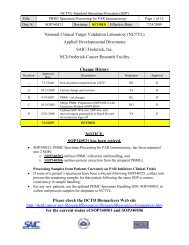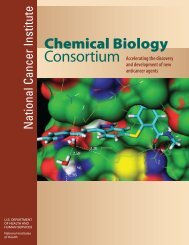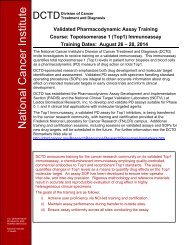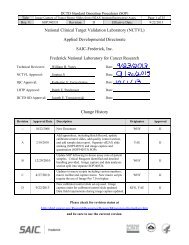National Cancer Institute - NCI Division of Cancer Treatment and ...
National Cancer Institute - NCI Division of Cancer Treatment and ...
National Cancer Institute - NCI Division of Cancer Treatment and ...
Create successful ePaper yourself
Turn your PDF publications into a flip-book with our unique Google optimized e-Paper software.
Joint Early Therapeutics<br />
Development Program<br />
The <strong>Division</strong> <strong>of</strong> <strong>Cancer</strong> <strong>Treatment</strong> <strong>and</strong><br />
Diagnosis (DCTD) is reexamining its<br />
discovery <strong>and</strong> development paradigm.<br />
Pharmacokinetic <strong>and</strong> pharmacodynamically<br />
(PK/PD)–guided clinical trials are<br />
being emphasized in conjunction with<br />
assays <strong>of</strong> specific molecular targets. Such<br />
studies are already used to examine the<br />
biological effects <strong>of</strong> drugs in animals <strong>and</strong><br />
humans. By studying PK/PD responses,<br />
researchers will be better able to administer<br />
the appropriate dose to achieve<br />
the desired therapeutic response with<br />
a minimum risk <strong>of</strong> toxic effects.<br />
A new collaborative effort between the<br />
DTP drug developers in DCTD <strong>and</strong> the<br />
programs <strong>and</strong> clinicians at the Center for<br />
<strong>Cancer</strong> Research (CCR), called the joint<br />
early therapeutics development program,<br />
uses PK/PD principles to streamline the<br />
development <strong>of</strong> novel cancer therapeutics.<br />
This initiative builds on CCR’s strengths<br />
in integrated research <strong>and</strong> its clinical<br />
program, as well as DCTD’s expertise in<br />
drug development <strong>and</strong> its relationships<br />
with pharmaceutical companies. The<br />
goal is to shorten the drug development<br />
timeline for new molecular entities <strong>and</strong><br />
cytotoxic agents by rapidly screening<br />
new drugs in humans before making a<br />
commitment in time <strong>and</strong> resources to<br />
a full therapeutic development plan.<br />
In 2005, this new initiative began to take<br />
shape. DTP’s Toxicology <strong>and</strong> Pharmacology<br />
Branch identified laboratory resources<br />
required to support the program <strong>and</strong> is<br />
working to exp<strong>and</strong> capacities to perform<br />
PD assays, in vitro toxicity analysis, <strong>and</strong><br />
N E W I N I T I A T I V E S<br />
virus toxicity testing. DTP also is augmenting<br />
its animal model efficacy program. A<br />
<strong>National</strong> Clinical Target Validation Laboratory<br />
was established within the Toxicology<br />
<strong>and</strong> Pharmacology Branch to assess the<br />
pharmacodynamic effects <strong>of</strong> therapeutics<br />
on cellular targets, perform target<br />
validation assays, <strong>and</strong> evaluate the consequences<br />
<strong>of</strong> anticancer drugs on patients<br />
in early clinical trials.<br />
Exploratory Investigational<br />
New Drug Studies<br />
The joint early therapeutics development<br />
program will utilize a recent guidance<br />
from the Food <strong>and</strong> Drug Administration<br />
(FDA) concerning exploratory studies <strong>of</strong><br />
INDs. Exploratory IND studies, which are<br />
also called phase 0 trials, will facilitate<br />
targeted therapies being tested in patients<br />
earlier in the drug development process.<br />
This will allow informed decisions to proceed<br />
or stop with that particular drug’s<br />
development before expensive bulk drug<br />
formulation <strong>and</strong> other steps such as additional<br />
preclinical toxicology occur. New<br />
advances in imaging technologies, which<br />
can help detect whether an agent being<br />
tested is reaching its target <strong>and</strong> producing<br />
the desired effect, will also be employed.<br />
A unique aspect <strong>of</strong> the program is that<br />
extramural drug developers, for the first<br />
time, will be <strong>of</strong>fered opportunities to<br />
utilize CCR resources for clinical trials<br />
support. C<strong>and</strong>idate compounds for<br />
exploratory IND studies may come<br />
from intramural, extramural, academic<br />
<strong>NCI</strong>-funded, or industry laboratories.<br />
Consideration will be given to novel<br />
small molecules, antibodies, or peptide<br />
D E V E L O P M E N T A L T H E R A P E U T I C S P R O G R A M ■ 97










